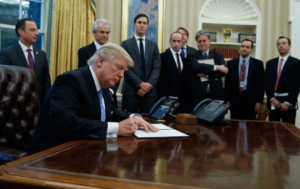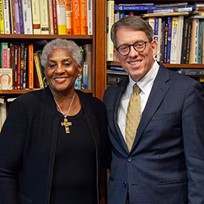Brazil under Temer
Ms. Kiratiana Freelon, Special Correspondent


These two pictures have much in common. There are no women in the photo. There are no black people. They feature two new presidents, Michel Temer of Brazil and Donald J. Trump of the United States, with their newly assembled teams.
When Brazil’s President Michel Temer took office after former President Dilma Rousseff was forced out due to corruption, many Afro-Brazilians feared that the progress they had gained in the last 15 years would disappear. In fact, the first cabinet that Michel Temer appointed included no women or Afro-Brazilians. Within three days of becoming president, Temer eliminated the ministry of culture, women and racial equality and human rights. Afro-Brazilians, who make up to 50 percent of Brazil’s 200 million population, saw this as an omen for the future.
“We had 14 years of advancement and now within the last six months we have regressed 25 years,” said Reinaldo Santana, a cultural producer in Rio de Janeiro. In the last six months, their fears have been confirmed. Afro-Brazilians have lost many of the advancements gained in the last 15 years including special rights, laws, and even wealth.
The last 15 years were good to all Brazilians but they were especially good to Afro-Brazilians. The wealth and higher education of Afro-Brazilians increased more from 2003 to 2016 than in all of Brazil’s history. The Workers Party ruled the national government during those years and ushered in federal policies that helped Afro-Brazilians and poor people, of whom Afro-Brazilians over represent. Investment in higher education exploded. The federal government began to support lower-income students to attend private universities. The Supreme Court, then led by a black man, even approved racial and public school quotas for access into free federal universities. The minimum wage, which disproportionately affects Afro-Brazilians, increased from 200 Reais a month to more than 900 Reais. In the previous 10 years, it had increased by only 150 Reais. The Bolsa Família program supported the poorest with a monthly allowance for food.
Renata Martins studied filmmaking 10 years ago at a university in São Paulo with a federal government scholarship. She was one of the first people to benefit from the increased investment in higher education. Today she is a leader of a new movement for black film in Brazil. She says her entire life changed during the last 15 years. “Accessing university was just one of many changes that occurred in my life under this government,” she said. “My life didn’t just strengthen economically, but also ethnically, intellectually and professionally,” she continued.
Soon after President Temer came to office last summer he set to tackling the budget deficit. Instead of targeting the rich with a much-needed inheritance tax, however, he decided to cut the government’s budget, capping the financial outlays for education and social and health programs for the next 20 years. In an interview with Telesurtv, (http://www.telesurtv.net/english/news/Brazils-Austerity-Plans-to-Affect-Black-Communities-Most-20161120-0022.html) political scientist João Feres Júnior said, “The non-white population tends to be poorer than the white population so if you cut something like social services and policies for the poor in general you will affect more non-white people than white people.”
Reinaldo Santana calls the new government the “whitening” government. He





